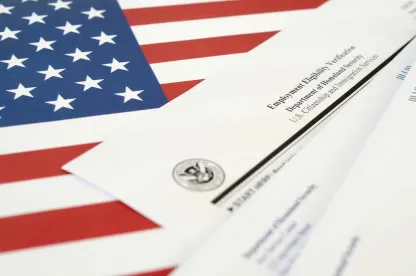According to the CDC, May 11, 2023 marked the end of the COVID-19 Public Health Emergency declaration. As of July 31, 2023, the COVID-related flexibilities around the I-9 processes will also officially come to an end.
On March 20, 2020, the Department of Homeland Security (DHS) and Immigration and Customs Enforcement (ICE) first announced some flexibilities for employers and workplaces operating remotely as a result of COVID-19 in order to assist with requirements related to Form I-9 completion and retention (which were discussed and analyzed in an earlier blog post). Additional ones were added over time. Some key flexibilities were:
Employers with employees taking physical proximity precautions were not required to inspect identity and employment documents in the employee’s physical presence. Employers were granted permission to inspect documents remotely (e.g. over video link, fax, email, etc.). Employers availing themselves of this option were to provide written documentation of their remote onboarding and telework policy for each employee.
If employees hired on/after April 1, 2021 would be working exclusively in a remote setting due to COVID-19-related precautions, they were temporarily exempt from the physical inspection requirements associated with the Form I-9 process until they undertook non-remote employment on a regular, consistent, or predictable basis or the extension of the flexibilities related to such requirements was terminated, whichever happened earlier.
Initial provisions were set to last 60 days but ended up being extended over a dozen times. However, all of the COVID-19 flexibilities will officially conclude as of July 31, 2023. The flexibility guidelines indicated that once normal business operations resumed, all employees who were onboarded using remote verification were to report to the employer within 3 business days for verification. Hopefully, many of these in-person reviews have been under way while businesses have been gradually returning to in-person operations. Either way, by August 30, 2023, all employers must complete in-person physical document inspections for those whose documents were inspected remotely.
As is often the case in an I-9 compliance context, the obligation is upon employers to understand, enforce, and adapt to the evolving guidelines. These temporary provisions were only in place for a few years, but many employers have become accustomed to the more convenient ways of working and will now need to stop and consider: Which employees were hired remotely and when? How were their I-9 documents verified and will they require an in-person inspection or has one already been completed? Have all Forms I-9 been annotated and updated, accordingly? Are there updated systems in place to continue supporting remote hires as needed?
In late 2022, DHS published a notice of proposed rulemaking attempting to establish more permanent options for allowing remote document examination. In the meantime, it is important to not only be aware of these types of changes and timelines, but to also explore different short- and long-term solutions for supporting the needs of the business while minimizing disruptions and limiting audit exposure risks in the face of such changes. Our attorneys have extensive experience with these issues and are ready to help clients navigate the ever-changing landscape of I-9 compliance.





 />i
/>i
